by Mayumi-H | Jun 30, 2012 | Fearless, Process
Perhaps that title is a bit misleading….
I recently started preliminary planning for a documentary project, and, as I did, I got to thinking about why I like to do what I like to do when it comes to video production. I’ve spent a good portion of my professional (job) life working with video, and much of that has to do with production. But, while I once fancied myself an actor, I’ve come to enjoy being behind the scenes more than being in front of a camera. Video production involves many steps, and many skills, but the one which I favor most doesn’t happen in production, at all. It happens in post-production: editing.
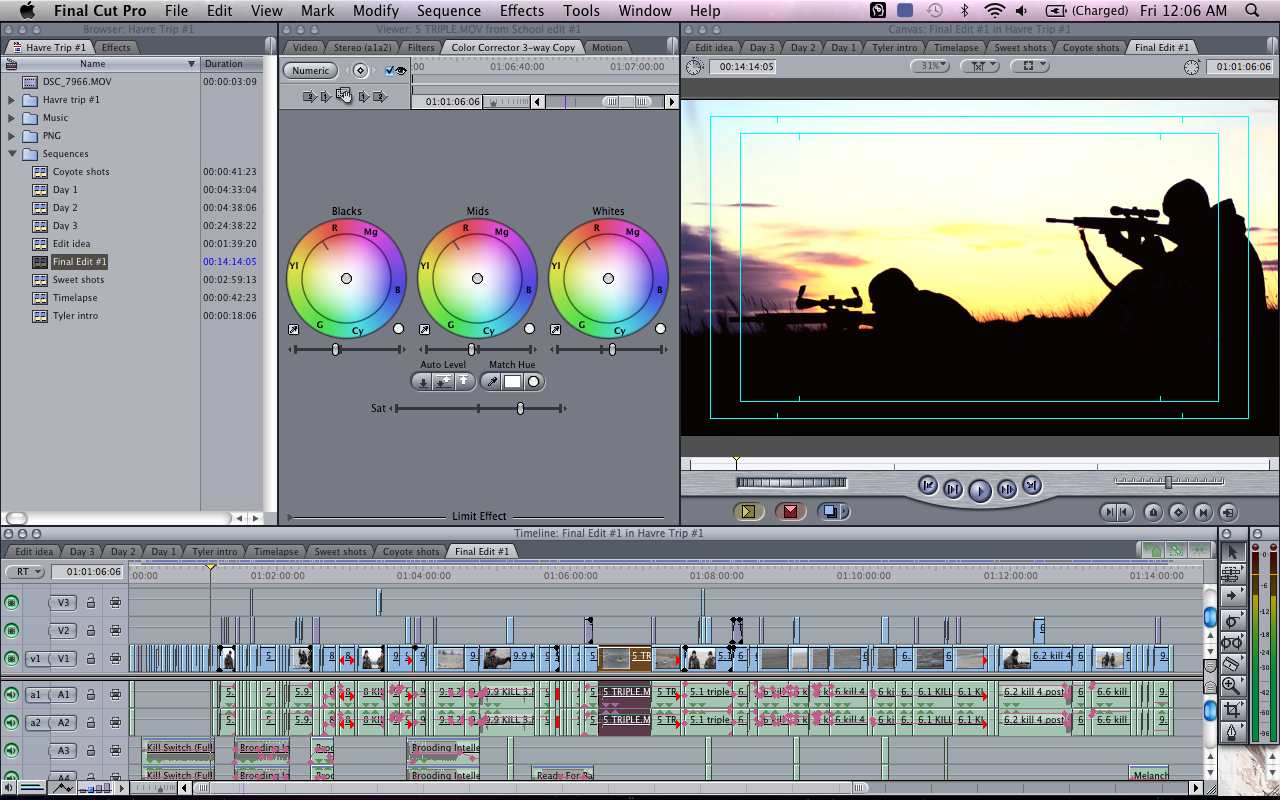
This is kind of my life.
I’ve edited lots of projects in my time: some small, some not. What I think I love most about that process, though, is that I get to be the one telling the story.
If you think about it, the editor has final input into how the story – especially one in video – plays out. We control the angles, the cuts, the music – all of the details, conscious and subliminal. And that controls how the audience views the characters, the conflict, and the outcome. A simple focus frame on a character’s face (whether they’re speaking or not) can give completely different meaning to a scene. That guy doing the intro for “The Outer Limits” was not kidding; we (editors, that is) control everything.
[youtube http://www.youtube.com/watch?v=8CtjhWhw2I8?rel=0&w=420&h=315]
It’s the same in writing, too, I think. The editor – whether that’s you doing your first edit or your professional editor doing the final one – controls what the reader sees, how they view the story. The editor doesn’t actively write any of the words of the story, though. Not in my experience, anyway. They help tell the story without writing the words, guiding the writer’s hand and vision with cuts, suggestions, and insight.
We video editors do the same thing. We’re given rough footage, where plot, point, characterization can go one of any number of ways. And, when we’re finished, assuming we’ve done our job right and well, the audience gets a story. Hopefully a good one. But marked by our hands, no matter that.
I’m excited to work with an editor for my first real novel. I’m scared, too; I’ve never put such a huge work – such a gigantic chunk of myself – out there for someone else to tear down. But I want to build a better story than I could do alone. I just hope I get an editor who’s as careful and conscientious as I try to be.
Have you worked with a professional editor before? Was it a good fit, or a not-so-good one? What did you learn from that process?
by Mayumi-H | May 26, 2012 | Process
I’m a fan of DVD extra features, but this one kind of blew my mind.
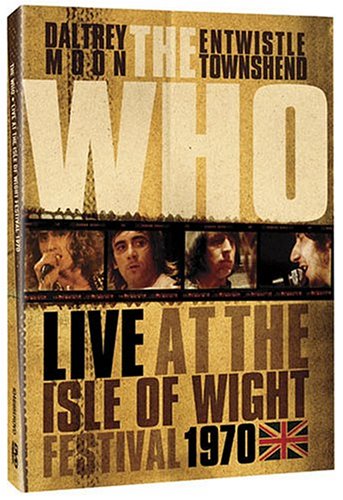
Come for the music. Stay for the insight.
I’ve always enjoyed the music and songs of The Who, and that has a lot to do with Pete Townshend’s storytelling. Yes, that’s right: the lyricist as a storyteller, just like a novelist or poet (or any of the fancy-schmancy names we dream up for ourselves as people who just want to tell stories).
Watch the Isle of Wight Festival concert footage, because it’s amazing to see an honest-to-God rock band in their prime kicking out hit after hit for the better part of 100 minutes. But then click on over to the Special Features, and watch the interview with Townshend. About 2/3 of the way through, he describes the difference between an Artist and a Craftsperson.
The Artist, he says, tells a story from inside, a story made for the Artist, first. The Craftsperson, on the other hand, tells a story to meet demand, a story made for selling. He likens a Craftsperson to a Hollywood screenwriter, who can churn out blockbuster hits, what audiences and studios want. An Artist, meanwhile, can’t do that; an Artist is too engaged with his own story to let it be compromised by anyone else.
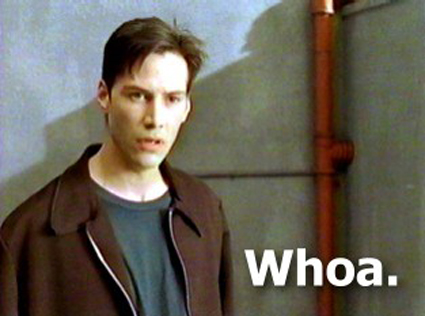
There is nothing wrong with being either an Artist or a Craftsperson, in my opinion. (Townshend seems to agree; he says with some admiration about the Hollywood blockbuster writer, “I don’t know how they do it.”) And, I think that a storyteller can be both, at the same time. But one side will have dominance over the other.
I don’t know whether I can call myself an Artist. I definitely prefer to tell stories that are personal to me, though. And I admire real Craftspeople, who can sacrifice parts of their stories to give them more mass appeal, to succeed with a wider audience. I think that’s necessary, if a storyteller wants to be monetarily successful. But there’s a part of me that considers it a Faustian bargain, too: What part of my soul will I have to give up, to give my stories the success I think they deserve?

“Just sign on the line, Miss….”
Not having reached that point of decision-making, yet, I can’t say for certain my answer.
I’m willing to edit my stories, if I think they’re worthy of the effort (some aren’t). But I don’t know if I could, say, change an ending to make the story more widely accessible, or change a character’s sexual orientation to appeal to a different audience. I think I’d rather just print up the story on my printer, in that case, make myself a personal cover, and call it a day.
What do you think? Are you an Artist or a Craftsperson? Both, or neither?
by Mayumi-H | Apr 14, 2012 | Fearless, From Hell (A Love Story), Process
I think Dave Sim is a bastard. An accomplished bastard, to be certain, but a bastard nevertheless.
During his 300-issue run on his independent (that’s self-published, to the literary crowd) comic book Cerebus, he used the titular character as an outlet to complain about many grievances he had about the world, most notably the role of women in it. Sim was not a happy guy when it came to women, during this time, and he made no secret about it. Of course, he was going through an ugly divorce from his wife, so it’s somewhat understandable. It doesn’t really excuse the way he took a dump on women in general in his book, but I suppose he had his reasons.
Still, despite his somewhat misogynistic words, I still find – even to this day – that I have to admire the guy. Why? Because he wrote what he wanted.
There’s a lesson in there, right? I mean, I may not agree with his perspective, but he wrote the story he wanted to write, and if readers didn’t like it, that was their fault. It reminds me of a response another writer (Rick Remender) gave to a fan, who’d written an opinion letter saying that Remender was not writing a beloved character the way that the fan thought he should be written. I’m going to paraphrase Remender’s response to this, but it was, essentially:
I am writing this story. Not you. So shut up.
Man, that response gives me wonderful chills every time I think of it. I’m going to write it again just for that reason.
I am writing this story. Not you. So shut up.
I read a lot of articles and blog posts and comments from, about, and to writers, many of whom seem to be slogging through the same drama I am: writing a novel, which we hope we can sell, of course, but that’s not all there is to it.
Many of us are in love with our stories. I know I am. But, like love for anything, there comes with it a deep sense of trepidation. Are we doing what’s best? Are we doing it right? Are we going to be hurt when we put this out there for everyone to see? The answers, of course, are yes, yes, and – sadly – yes. But I think that we can take a lesson from the bastards out there.
We should tell the stories we want to tell. We should tell these stories the way that we want to tell them. And if someone out there doesn’t like the story, that’s their problem.
Of course, there is value in writing for your audience. And we can’t all be Dave Sim or Rick Remender, able to write whatever in Hell we choose because people will buy the work regardless due to brand loyalty or whatever.
But, for pity’s sake, love your story. Have faith in your story. If you don’t love it first, if you don’t have faith in it first, who do you think is going to follow after you?
[youtube=http://www.youtube.com/watch?v=0Zzfdlxjx4Y]
The video above is of the Muppet performers singing “Just One Person”, from Snoopy! The Musical, at Jim Henson’s memorial service. If you can watch it and listen to those words without tearing up at least a little bit, I don’t think I want your support.
No matter what you create, you owe it to yourself to trust in your own vision. Be willing to take advice and criticism, and be willing to listen to other people who have the good of your story at heart, even if the words they have to say may be harsh to your ears. But always remember that this is your work. And if you don’t love it first…well, no one else will.
by Mayumi-H | Apr 7, 2012 | Process
In a recent “Media Strategy Saturday” post over at The Red Pen of Doom, Mr. Guy (whose work you should be reading if you are in the creative business at all…and even if you’re not, it’s funny and insightful stuff he’s writing, over there) suggested that everyone play the one-word-to-describe-yourself game. Whether meant facetiously or not, I took it to heart.
So I thought: How would I describe myself, in one word, as an artist/writer/creator?
I reflected on this question for a while, and even bounced some ideas off of my husband. (His suggestions? “Unappreciated” and “misunderstood.” “Tight-ass” was in there, somewhere, too, but I argued that was technically two words, if taken the way I preferred, with all of those early morning workout sessions.)
The issue I started to have was that most of the words I came up with had pretty bad connotations. “Exacting,” for example, creates a picture of a rigid nun…and not the bad-ass, gun-toting kind like Ghost Rider got to pal around with. (I know from whence I speak on this topic, by the way. Sixteen years of Catholic schooling will do that to a person.)
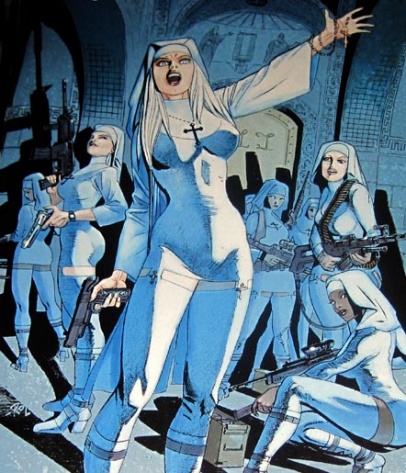
The Gun Nuns from Jason Aaron's recent stint on "Ghost Rider"
Other words that came to mind were equally problematic: “Creative” feels too generic, and it doesn’t properly convey my approach to wordsmithing and research. “Observant” might be accurate, but it says nothing about my skills as a writer. And “indelible” just makes me sound like a pompous jackass.
But there was one word – my first choice, funnily enough – that kept coming back to me: Diligent.
It’s not a bad word, certainly. Not as exciting or engaging as I would like it to be, as a word for people to think of when they remember me. But not bad, as the squirrels can attest.
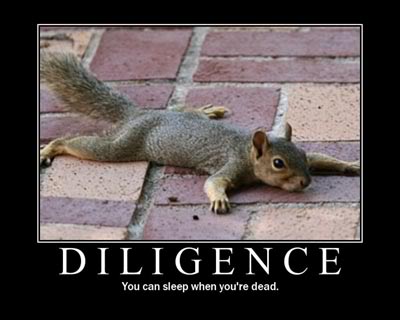
"I'll sleep when I'm dead."
I may not be the brightest star in the sky, or the swiftest wave on the beach. But I always see a project through to its end. And while my writing may never catch on (or catch up) to the masses, I love making stories, and I’ll never give up. Not ’til I’m dead, anyway. And then, I suppose all of this self-interested stuff won’t really matter.
So! What’s your one word?
by Mayumi-H | Mar 12, 2012 | Process, Uncategorized
I’m going to be honest. My husband – whom I love – has not read anything of mine since our uni days. Articles, short stories, drabbles, novellas, monstrous works of fan fiction: they’ve all gone unseen by his eyes.
He’s not the only one in my family who doesn’t read my work, of course. My parents are probably afraid to know what I write, and my in-laws don’t want to spend much time around my husband, let alone me, so they’re out of the loop, as well. My sister reads my work occasionally, but she has a family of her own, and our tastes don’t exactly match up. I have an aunt who takes an interest from a creative standpoint, but even her feedback is very general, and I get the impression that she’s being supportive of my writing simply because I’m following my muse, not because she thinks my work is good. And the girls…well, let’s just say they’ve got more primal interests (food, naps, playtime) on their minds.
So, I often get left to ponder and second-guess myself whenever I put down more than a few words on a piece of paper.
Now, I’ve spent most of my life huddled up at my desk, scribbling or typing away the words of my imagination, so I’m used to the solo aspect of writing. And, for some of it, I wouldn’t want anyone to see. It’s for me alone to read, like a personal journal expressed in fictional characters and adventures. Or, it’s just plain bad. So, I can’t really complain about that.
But the husband thing… The husband thing bothers me.
This is my mate. The person whom I’ve chosen to lean on when times are tough. Not sharing something so integral and personal to me such as my writing feels like I’m keeping a secret from him. A secret that I want so badly to tell.
When we first started dating (and I hesitated to use that word, since our relationship was not your typical pick-up, go to dinner and a movie situation), I made the utterly stupid mistake of showing him some of my younger work. That stuff was terrible, and I’m certain that that is what soured him to my fictional musings. But I’ve grown so much since then…! And I want to be able to talk with him about this part of my life which is so important.
So, I write away, tapping at my laptop and note-taking machine that on rare occasion doubles as a telephone, and I wonder how to get him to open up to what I do. He says he’d like to read my stories…but I don’t want it to be like mowing the lawn or taking out the garbage. I don’t want this to have to be a chore for him. I want his support. I want him to know what I’m capable of doing. But I feel like he needs to come to it willingly. I’ve even given him the easy out of just reading some of my 100-word drabbles. “They’re only a hundred words,” I tell him. “You can read them in less than a minute!”
But, no.
He does support my writing in other ways, of course. When I need to work without distraction, he lets me do so. He takes care of the girls, handles the chores, whatever, so that I can lock myself away and get down to some serious writing. But I don’t think he’s ever actually read anything that I’ve created in the last ten years.
He’s my husband – whom I love – and I don’t want to give up on this. But maybe it’s time I do so.







Recent Comments